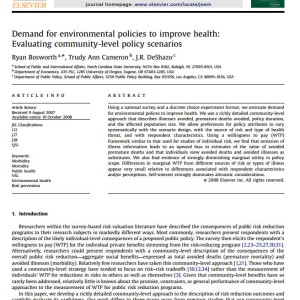
Authors: Ryan Bosworth, Trudy Ann Cameron, J.R. DeShazo
Date: October 8, 2010
Project: [wpv-post-link id=”$project”]
Using a national survey and a discrete choice experiment format, we estimate demand for environmental polices to improve health. We use a richly detailed community-level approach that describes illnesses avoided, premature deaths avoided, policy duration, and the affected population size. We allow preferences for policy attributes to vary systematically with the scenario design, with the source of risk and type of health threat, and with respondent characteristics. Using a willingness to pay (WTP) framework similar to that used for studies of individual risk, we find that omission of illness information leads to an upward bias in estimates of the value of avoided premature deaths and that individuals view avoided deaths and avoided illnesses as substitutes. We also find evidence of strongly diminishing marginal utility in policy scope. Differences in marginal WTP from different sources of risk or types of illness appear very small relative to differences associated with respondent characteristics and/or perceptions. Self-interest strongly dominates altruistic considerations
Link to Publication